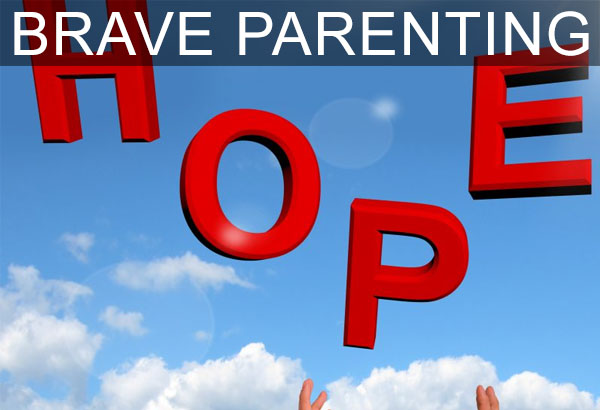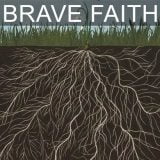Teens Learn Hope From Parents

This nugget from Dr. Brene’ Brown’s book, Atlas of the Heart, stopped me.
“It’s also important to know that hope is learned. According to Snyder, children most often learn the habit of hope from their parents. To learn hopefulness, children need relationships that are characterized by boundaries, consistency, and support. Children with high levels of hopefulness have experience with adversity. They’ve been given the opportunity to struggle, and in doing that they learn how to believe in themselves and their abilities.
“As someone who struggles watching my kids struggle, I can tell you—this is hard. I remind myself of the saying, ‘Prepare the child for the path, not the path for the child.’ One thing that bolsters my commitment to letting my kids figure out on their own things that are both developmentally appropriate and possible is thinking about the alternatives: hopelessness and despair. –Dr. Brene’ Brown, Atlas of the Heart, p. 101
Snyder is in reference to C. R. Snyder and his book, Handbook of Hope. I’m sure I want to read more about this but the book costs $120. So…
I write a lot about hope because it is a part of bravery. Hope isn’t an emotion. Hope isn’t optimism. Hope is a habit. Hope is a way of thinking that requires brave decisions. John Parsi, the executive director of the Hope Center (I’ll call him an expert) says,
“Optimistic people see the glass as half full, but hopeful people ask how they can fill the glass full.”
–John Parsi, The Hope Center
These are the brave decisions. These are the tenacious decisions to make that Plan B because you believe you are worthy of something good happening to you.
This is something that cannot be offloaded to God. This is you having to enter the emotional tunnel and travel through the whole tunnel. This is hope having bloody fists.
So, of course, I took notice when one of the voices in my head said that parents are the ones to teach that hope is a habit. And then she gifts us with the how to parent and teach hope. These are all Bravester.
Boundaries
Every teen needs to learn boundaries or “what is okay and what is not okay.” This is Parenting 101. There are many reasons why this is Parenting 101 but for the reason of hope research discovered that boundaried people are the most compassionate people. You want to raise a teen who knows how to show compassion for the world. This builds hope. Your teen will not be afraid to make that brave decision to show compassion because your teen will know that the failure of that compassion does not change who they are. They are free to hope and believe in the others.
Consistency
This is another Parenting 101 lesson but to stay consistent is so hard. This is your brave decision to brave decision to brave decision. Because there are days you just want to slack off and take the easy way.
This is the gift you give your teen when you can be tenacious in consistency just this bit longer: Your teen will learn how to predict life. When your teen can’t figure out how to gauge you, your teen will have even more trouble gauging the world. Your teen is then learning how to live with anxiety and chaos where it is supposed to be the safe place.
The world is scary and unpredictable enough. Your teen needs to have the home be the safe place to navigate boundaries, adversity, and failures. They will learn this from gauging you. So your teen can then take on the world with hope.
Support
There is rah-rah support which means basically I am saying the words but I’m not showing the words to be true in my consistency. Then there is the support that allows for adversity and failure, as well as the successes, and then feels into the pain of failure and walks your teen all the way through that emotional tunnel.
You don’t forget someone who carries your pain. You feel even more loyal to that person. This can be you.
When you feel supported like this, one cannot help but be a hopeful person feeling worthy to make that Plan B.
Experience with adversity
Encourage your teen to do the hard things. As this one 14-year old teen wrote, this actually helps brain growth. That is reason enough.
With your support you can teach your teen so much about navigating through adversity. It is the first decision after deciding to not quit that begins the life lessons.
To encourage you to help get your teen past that decision to not quit, this is a great example from John Parsi:
“If there’s an accident on the I-10 or construction on the Broadway curve, I have to work around that to get to my destination. I can’t just stop in the middle of the highway and give up. I have to navigate through the traffic using hope theory and ultimately take agency to literally steer my actions.” Source.
How does that win feel now? Give your teen that feeling. Even as you feel the agony of the process. (You will.)
Do this before your teen turns 18, when you have a lot more say in your teen’s life.
Opportunity to struggle
There is a lot of discomfort in struggling. Discomfort can teach your teen so much.
Discomfort teaches problem solving and coping skills. You get the privilege of teaching your beloved the right coping skills.
Discomfort teaches grit and the power that grit will have for the rest of his/her life.
Discomfort also teaches the the joy of overcoming. Can you see how the practice of overcoming leads to hope?
Failure is a Bravester value. Failure teaches so much, including to not fear failure. We have this great resource for you about failure for teens.
Suffering is a part of your teen finding his/her identity. Which is hopefully an identity of hopefulness.
The alternative to not doing these hard things as parents, as Dr. Brene’ Brown shared, is hopelessness and despair. None of us want this.
Then there is this. This is what I believe in my soul. This is why I’m in my 40th year of working with teenagers as a pastor. Teens who grow with hope will be our worldchangers. They will make the brave decisions. They will love even though that love will lead to heartbreak because this is what worldchangers do. They will figure out how to make that Plan B and love again. This will change our world.
I believe in teens! Thank you, parents. Someone is cheering for you.






